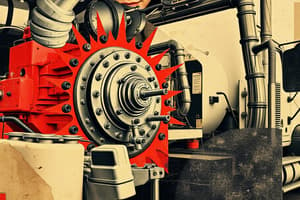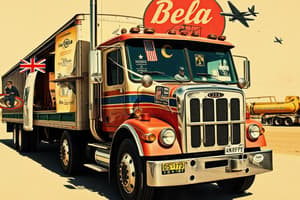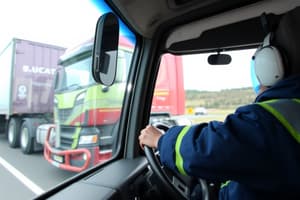Podcast
Questions and Answers
What do shippers package in order to contain hazardous materials?
What do shippers package in order to contain hazardous materials?
The material
Why do drivers placard their vehicles?
Why do drivers placard their vehicles?
To communicate the risk
What three things do you need to know to decide which placards you need?
What three things do you need to know to decide which placards you need?
Material's hazard class, amount being shipped, and amount of all hazardous materials on your vehicle
Where must the hazardous materials identification number appear?
Where must the hazardous materials identification number appear?
Where must you keep shipping papers describing hazardous materials?
Where must you keep shipping papers describing hazardous materials?
Around which hazard classes must you never smoke?
Around which hazard classes must you never smoke?
Which three hazard classes should not be loaded into a trailer with a heater/air conditioner unit?
Which three hazard classes should not be loaded into a trailer with a heater/air conditioner unit?
Should the floor liner required for Division 1.1 or 1.2 materials be stainless steel?
Should the floor liner required for Division 1.1 or 1.2 materials be stainless steel?
What precautions must be taken when loading 100 cartons of battery acid with 100 pounds of dry cyanide on board?
What precautions must be taken when loading 100 cartons of battery acid with 100 pounds of dry cyanide on board?
Name a hazard class that uses transport indexes to determine the amount that can be loaded in a vehicle.
Name a hazard class that uses transport indexes to determine the amount that can be loaded in a vehicle.
What are cargo tanks?
What are cargo tanks?
How is a portable tank different from a cargo tank?
How is a portable tank different from a cargo tank?
Should you turn off the engine before or after unhooking hoses after delivering compressed gas?
Should you turn off the engine before or after unhooking hoses after delivering compressed gas?
If your placarded trailer has dual tires, how often should you check the tires?
If your placarded trailer has dual tires, how often should you check the tires?
What is a safe haven?
What is a safe haven?
How close to the traveled part of the roadway can you park with Division 1.2 or 1.3 materials?
How close to the traveled part of the roadway can you park with Division 1.2 or 1.3 materials?
How close can you park to a bridge, tunnel, or building with the same load?
How close can you park to a bridge, tunnel, or building with the same load?
What type of fire extinguishers must placarded vehicles carry?
What type of fire extinguishers must placarded vehicles carry?
Flashcards are hidden until you start studying
Study Notes
Hazardous Materials Packaging and Communication
- Shippers must package hazardous materials to contain them effectively.
- Drivers must placard their vehicles to indicate the risks associated with the materials being transported.
Placard Considerations
- Three key factors for determining the need for placards:
- The hazard class of the material.
- The total amount of the material being shipped.
- The cumulative amount of all hazardous materials aboard the vehicle.
Hazardous Materials Identification
- The hazardous materials identification number must be displayed:
- On shipping papers as part of the shipping description.
- On the respective packages.
- On cargo tanks and other bulk packaging.
Shipping Papers Management
- Shipping papers must be kept:
- In a pouch on the driver's door.
- In clear view and within reach while driving.
- On the driver's seat when the vehicle is unoccupied.
Smoking Regulations Around Hazard Classes
- Smoking is prohibited around the following hazard classes:
- Class 1 (Explosives)
- Class 2.1 (Flammable Gas)
- Class 3 (Flammable Liquids)
- Class 4 (Flammable Solids)
- Class 5 (Oxidizers)
Hazard Class Loading Restrictions
- Classes prohibited from being loaded in a trailer with heater/air conditioning:
- Class 1 (Explosives)
- Class 2.1 (Flammable Gas)
- Class 3 (Flammable Liquids)
Floor Liner Regulations
- For Division 1.1 or 1.2 materials, a stainless steel floor liner is not required; the floors must be tight with a non-metallic or non-ferrous liner.
Precautions with Battery Acid and Cyanide
- Cyanide must not be loaded with any acids or corrosive materials to prevent the release of hydrocyanic acid.
Transport Index for Radioactive Materials
- Transport index is critical for radioactive materials; the total transport index in a single vehicle must not exceed 50.
Cargo Tanks Definition
- Cargo tanks are bulk packaging tanks primarily for liquids or gases, permanently attached to or part of a vehicle, not fabricated under cylinder specifications.
Portable Tanks Clarification
- Portable tanks differ from cargo tanks by not being permanently attached to the vehicle.
Engine Operation During Compressed Gas Delivery
- The engine should be turned off after product transfer and before unhooking delivery hoses.
Tire Maintenance for Placarded Vehicles
- Check dual tires at the start of each trip and stop to check every 2 hours or 100 miles, using a tire pressure gauge for accuracy.
Safe Haven Definition
- A safe haven is an approved area for parking vehicles loaded with explosives, designated by local authorities.
Parking Regulations for Hazardous Materials
- Maintain a distance of at least five feet from the traveled roadway when parking vehicles with Division 1.1, 1.2, or 1.3 explosives.
Distances from Structures
- Avoid parking within 300 feet of bridges, tunnels, buildings, or areas where people congregate.
Fire Extinguisher Requirements
- Placarded vehicles must have a fire extinguisher rated at a minimum of 10 B:C for the power unit.
Studying That Suits You
Use AI to generate personalized quizzes and flashcards to suit your learning preferences.




